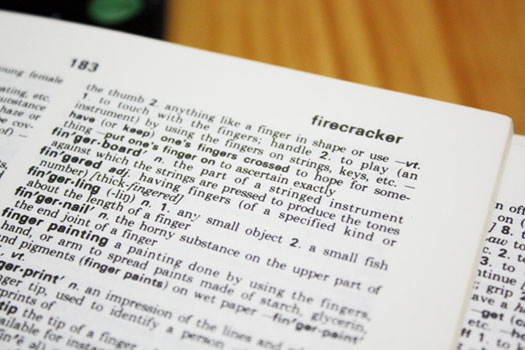advertisement
This is the last in a four-part guest series on reference skills by Jimmie from Jimmie’s Collage.
advertisement
So far we’ve looked at the importance of reference skills, using an index and table of contents, and using an atlas. Have you been incorporating more reference skills into your homeschool day? How is that working?
This final post features the dictionary. It is such a basic tool, but it actually can be very complicated to use if you don’t understand its jargon and layout.
Personally, when I’m in the middle of reading something and come across a new word, I generally use context to guess the approximate meaning, take my best shot at the pronunciation, and keep reading. Only when a word is so cryptic as to totally confuse me do I pull out a dictionary and look it up. This makes sense. Who wants to be constantly interrupted by referring to a dictionary? Your children are no different. I’ve never seen anyone who read with a dictionary by his side, looking up every new word as he encountered it.
However, you can encourage your children to note (underline, highlight, or list) new words as they read. Then later, they can use the dictionary to look them up.
This is where modeling dictionary use comes in to play. When you are reading aloud, and come across a word that you aren’t totally sure of (or know your child is not familiar with), you can verbalize your thinking something like this:
“Hmmm…I don’t know this word ‘impunity.’ From what we’ve read it must mean ‘something about punishment.’ But I think I’ll look it up later just to make sure.”
Later when you pull out the dictionary, talk out how you find the page it’s on. Go ahead and say,
“Impunity – I-M-P, let’s see, this is I-N. I’ve gone too far. I want I-M. Here is I-M-M. I need I-M-P. Ah, it should be on this page, between improper and incantation. And here it is. Impunity.”
It’s important for your children to hear the thought processes that are going on in your mind so that they realize there is a procedure we use to find words in the dictionary. It’s not just that we adults have some magical skill.
When you find the word, verify the pronunciation. If you were pronouncing it incorrectly, point out how you know that now based on the dictionary entry. Then read the meaning, part of speech, and whatever other information is offered. Try to use the word in another sentence and think of some synonyms.
For a more direct approach, spend a lesson or two teaching your children to use a dictionary. Two basic dictionary skills are alphabetizing and using guide words. This is usually where elementary level children begin. Moving beyond that, a middle school student should be able to use a dictionary to find the syllables and pronunciation, the part of speech, the etymology (word origin), and derivative forms of the word. And of course, finding the meanings of a word is the most common use of a dictionary.
Most dictionaries begin with a guide for using the book. But that long and exhaustive explanation can seem overwhelming to most students. I suggest you use that as a guide for yourself. Pick out an element or two to emphasize each time you pull out your dictionary. For a list of printable dictionary worksheets at varying levels, visit these dictionary activities.
Later you can have your children create their own dictionary worksheets or dictionary treasure hunts.
Just as with other reference skills, I believe that integrating the use of a dictionary into your normal homeschool day is the best way to teach the skills in the long run. One reason is you demonstrate that using a dictionary is a natural part of reading and studying (as it is and should be). Secondly, you have the opportunity to repeatedly
Secondly, you have the opportunity to repeatedly review dictionary skills each time you pull out a dictionary. It almost is a second language in there with all the abbreviations and symbols. Doing a few worksheets on dictionary skills is probably not going to stick for very long. But regular use of a dictionary for answering real questions will make the skills stick.
A conscious effort to include reference skills in your homeschool will go far towards making your children more independent learners. Also, make sure that your reference books are available to your children. Do they know where the atlas and dictionary are? Can they reach them? Do they have permission to pull them off the shelf at any time? Having such an “open shelf” policy will promote an environment of active learning in your home.
How often do you pull out your dictionary during homeschool lessons? Is the dictionary accessible to your children whenever they need to use it?

Join 40,000+ Other Awesome People
Subscribe to the Real Life at Home weekly newsletter to get our latest content, exclusive free printables, learning activities, and ideas for celebrating with your kids all year

What is your opinion on using an online dictionary? I used to have my daughter look up words in an actual dictionary until we found Merriam-Webster’s online dictionary. It is so much faster and the information is the same.